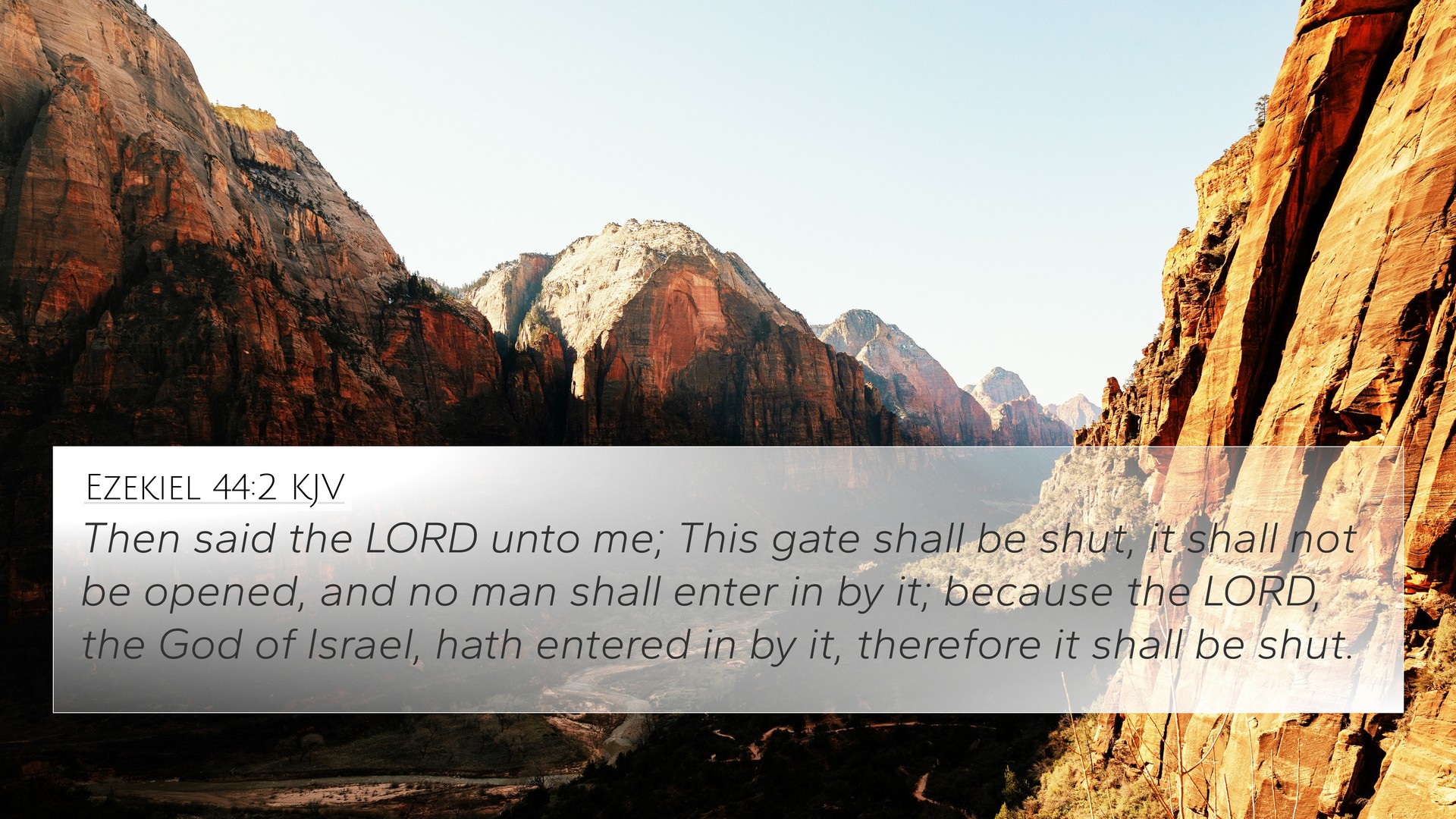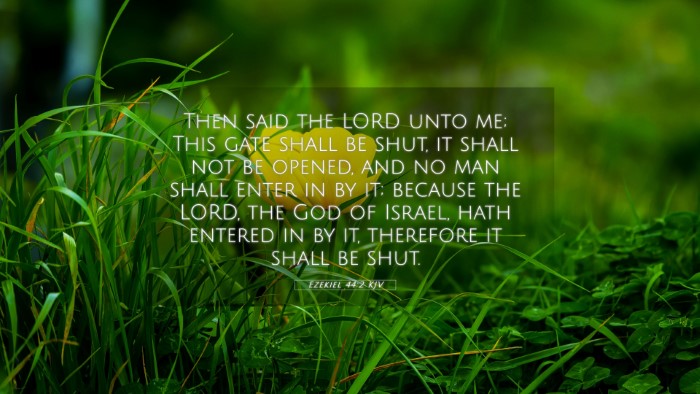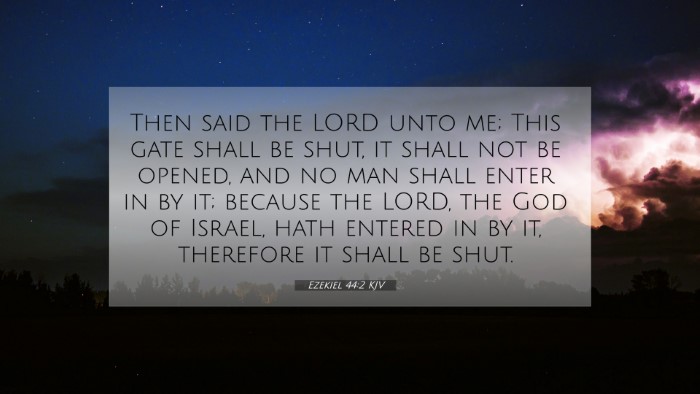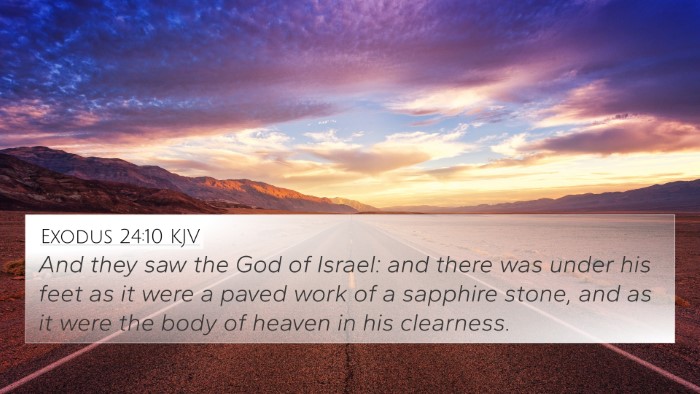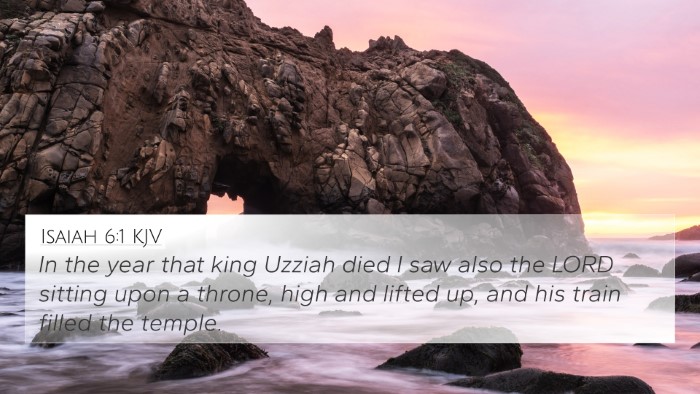Ezekiel 44:2 - Commentary and Insights
Bible Verse: Ezekiel 44:2 - "Then said the Lord unto me; This gate shall be shut, it shall not be opened, and no man shall enter in by it; because the Lord, the God of Israel, hath entered in by it; therefore it shall be shut."
Meaning and Interpretation
The verse in Ezekiel 44:2 emphasizes the holiness and sanctity of the presence of God. The gate in question symbolizes an exclusive entrance for the Lord, indicating both His divine authority and the special relationship between God and His people. Various commentaries provide deeper insights into the implications of this verse.
Commentary Insights
-
Matthew Henry's Commentary:
Matthew Henry reflects on the significance of the gate being shut, indicating that once the Lord enters, human access is restricted, signifying His holiness. He emphasizes that this closure represents a divine ordinance, safeguarding the sanctum from defilement.
-
Albert Barnes' Notes:
Barnes points out that the phrase “the Lord, the God of Israel” establishes the identity of the deity involved, stressing that this gate is for divine use only. The closure symbolizes a barrier between God’s holiness and mankind’s sinfulness.
-
Adam Clarke's Commentary:
Clarke adds that the shutting of the gate signifies the permanence of God's presence once He chooses to dwell among His people, implying that entry is not a freestanding privilege but a divine grace.
Theological Themes
This verse delineates several important theological themes:
- Divine Holiness: The closure of the gate indicates that God's holiness cannot coexist with impurity.
- Sovereignty of God: God's decision to designate a specific entry point reflects His ultimate authority over worship and access to Himself.
- Separation from Sin: The imagery of the gate suggests a physical and spiritual barrier to sinfulness, underscoring the need for purification.
Bible Cross-References
This verse connects with several significant scriptures:
- Isaiah 6:1-3: A vision of God's holiness and majesty, emphasizing the gap between divinity and human condition.
- Zechariah 14:21: Discussion of holiness in worship, where all conduct should honor God.
- Matthew 27:51: The tearing of the temple veil signals the removal of barriers between God and humanity due to Christ’s work.
- Hebrews 10:19-22: Access to God is invited through the new covenant established by Jesus Christ, contrasting the exclusivity seen in Ezekiel.
- Revelation 21:27: Only those written in the Lamb’s book of life can enter the eternal city, reflecting the continued theme of holiness.
- Revelation 3:7: The one who holds the keys to David indicates divine authority over access to God’s presence.
- John 10:9: Jesus as the door, indicating that true access to God is only through Him, reaffirming the concept of special access.
Applications for Life
Understanding Ezekiel 44:2 has practical implications for believers today:
- Celebrating God's Holiness: Recognizing the importance of a holy relationship with God and respecting the sanctity of His presence in worship.
- Access through Christ: Acknowledging that through Jesus, we have direct access to God, contrasting with the exclusive practices of Old Testament worship.
How to Use Bible Cross-References
Exploring cross-references is essential for deeper Bible study. Here are some suggested methods:
- Utilize a Bible concordance to identify verses related to holiness and access to God.
- Engage in cross-reference Bible study by mapping relationships between passages about worship styles and access.
- Employ thematic studies on Bible verses that relate to each other to cultivate understanding of sacred space.
Conclusion
Ezekiel 44:2 serves as a powerful reminder of God’s holiness and the significance of divine presence in the lives of His people. Understanding this verse not only enriches individual study but also enhances collective worship experiences.
Further Study Recommendations
For those interested in pursuing this topic further, consider examining:
- Thematic Bible verse connections related to the holiness of God throughout both the Old and New Testaments.
- Comparative Bible verse analysis focusing on scriptures involving access and barriers in worship.
- Detailed cross-reference studies of prophets and apostles regarding divine access to God.
